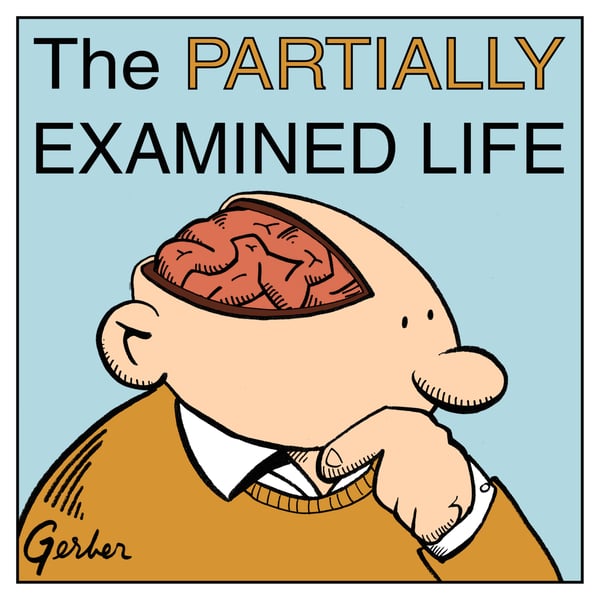PEL Presents SUBTEXT: Identity and Infamy in “Citizen Kane” (1941) (Part 2)
The Partially Examined Life Philosophy Podcast
Mark Linsenmayer
4.6 • 2.3K Ratings
🗓️ 21 January 2024
⏱️ 289 minutes
🧾️ Download transcript
Summary
It’s a film bursting with objects—the treasure troves of Xanadu, a snowglobe, jigsaw puzzles, a winner’s cup, the famous sled. Even the conceptual elements of the film’s plot are expressed tangibly. Kane’s mind-boggling wealth isn’t an abstraction, but a list of concrete holdings—gold mines, oil wells, real estate. And the news Kane controls and manipulates, when yoked to another noun, is something one can hold in one’s hands: a newspaper. Kane, too, is described as the incarnation of several abstractions. As his obituary tells us, he himself was “news,” as well as the embodiment of whole years in a swath straddling the 19th and 20th centuries. One might call him the American idea personified. But what these terms really mean and how they’re made manifest in Kane is hard to pin down. At times, he seems to be no more than a vast, empty planet around which objects swirl. What’s at his core, then? What did his life mean? One reporter searching for the secret of Kane bets that just one fact—the identity of “Rosebud”—would explain his whole life. Another suggests that it’s in the sum total of his possessions. Yet another thinks, curiously, that even Kane’s actions won’t tell us who he really was. So what, then, determines his or any identity? What’s the measure of a person? The objects they possess? The abstract ideals they claim to stand for? Their actions? Or something still deeper? Wes & Erin discuss possibly the greatest film ever made: from 1941, Orson Welles’s “Citizen Kane.”
Transcript
Click on a timestamp to play from that location
| 0:00.0 | You're listening to an airwave media podcast. |
| 0:04.0 | Okay, welcome to part two of our discussion of Citizen Kane. We had just gotten done talking about |
| 0:19.3 | the complicated way that Kane comes across, especially in that scene where |
| 0:25.2 | Getty is threatening him and the Getty doesn't come across entirely as |
| 0:30.4 | simply a villain in contrast to Kane, Kane is just as a villain in that scene. |
| 0:37.0 | And something you said, Aaron, I thought was very interesting, which is that he never does anything good good and I'm trying to think if he |
| 0:44.8 | ever does anything good. And it you know on first blush that seems right to me and it |
| 0:50.6 | would be interesting to think of what if the film had him do something that was unequivocally good that it's kind of saved the cat moment in the film where the protagonist is made likable to the audience, whatever his trajectory is going to be, it might make the tragic |
| 1:07.6 | downfall. They might give it more emotional heft, I don't know. |
| 1:12.8 | In that first scene where we first see him as an adult |
| 1:15.6 | in the newsroom, young Orson Wells, |
| 1:18.4 | there's at least a hint of that. |
| 1:20.5 | There's a kind of idealism there, seems it makes you think that maybe you're |
| 1:25.2 | going to see him actually do good things with his newspaper maybe he is going to |
| 1:30.4 | expose someone's corruption and the one the person who's corruption he does |
| 1:37.4 | expose Gedis that again that is made more complicated by the fact that he wants to defeat |
| 1:44.4 | Gedis politically and is using his own newspaper in a corrupt way to support his own |
| 1:51.7 | campaign. Thinking through this, I can think of one instance in which he does something we might call good. |
| 2:00.0 | And I'm thinking that this might actually turn out to be a lot more significant, maybe |
| 2:04.7 | symbolically than I had considered before. |
| 2:08.0 | And that's when he's distracting Susan, when she has her too fake, right? |
| 2:12.5 | I love that scene. |
... |
Please login to see the full transcript.
Disclaimer: The podcast and artwork embedded on this page are from Mark Linsenmayer, and are the property of its owner and not affiliated with or endorsed by Tapesearch.
Generated transcripts are the property of Mark Linsenmayer and are distributed freely under the Fair Use doctrine. Transcripts generated by Tapesearch are not guaranteed to be accurate.
Copyright © Tapesearch 2025.

